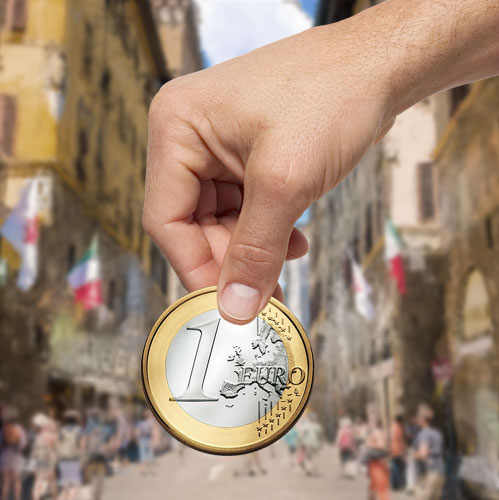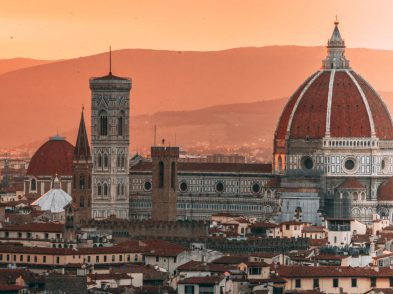Every week at least one client contacts my legal firm to help them achieve their “Italian dream” of buying real estate here. Many people ask about the “one-euro homes” and whether Italy is really selling property that cheaply to promote villages that are experiencing depopulation. Of course, all that glitters is not gold, and there is a lot of information left unsaid in the magazines that publish articles about this type of investment.
A lack of financial resources or interest in investing in renovations as well as the taxes incurred are just some of the reasons why homeowners decided to get rid of these properties. So, they abandoned or legally donated the property to the local government, which sells homes for the symbolic amount of one euro through a public procedure. These houses are often a burden for small towns and sometimes even dangerous to public safety. By offering these properties for such a symbolic price, the hope is to encourage people to choose these areas as their future homes. Do yourself a favor and avoid scams by looking online for official information provided on the website of each of these municipalities to determine the exact terms and conditions to qualify for these investments. While buying a property in Italy for one euro seems extraordinarily appealing, there are commitments that must be fulfilled by people who buy one-euro homes.

Renovation costs + other technical aspects
Buyers must usually provide a technical report within a limited timeframe that details the (extensive and expensive) renovation that will be completed after purchasing these properties. Renovation projects must typically start within 365 days of purchase. The buyer must pay notary fees for the sale of the property. The work should start within 3-6 months once all the permits have been obtained. Often the buyer must commit to moving their permanent residency to that municipality.
Extensive renovation, including the floor, roof and internal space, is normally required. Under normal conditions, the cost for this type of renovation is calculated at around 1,000 euro per square meter. In a short amount of time, you will already have spent 50,000 to 70,000 euro to restore a 70 square meter residence. This is about the same you would spend for a partially restored or turnkey property in a much more attractive and well-connected area (from a market point of view), like Greve in Chianti, Montepulciano, Radda in Chianti, Volterra and Lucca.
Additionally, the permissions needed to manage the renovations require a team of professionals, such as surveyors, architects and civil engineers, plus constant coordination with the contractors: masonry, plumbers, electricians. While in the US it is easy to contract one company to deal with all these aspects (and have one company representative who is responsible for the work), finding such a company capable of working in a different language and adapting to the needs of a foreign investor can be challenging. That’s why most of our clients only request turnkey properties when they hire us to help with completing the purchase.
Getting a permit to stay
The buyer’s nationality is never a problem: actually, the majority of the buyers are not Italian. However, buying a property doesn’t give you the right to get a permit-to-stay visa. In Italy, we don’t have a “real estate” visa or a visa scheme that allows you to stay in Italy just because you own property here. So, if you plan to stay in Italy for more than three months over a six-month period, you will need to obtain a visa to stay in Italy. If the one-euro investment you are considering requires you to set up your permanent domicile (or residenza) in that municipality, then you will be able to request a proper long-term national visa that will allow you to stay in Italy for as long as you want. Make sure you get in touch with a lawyer before you complete your real estate investment to determine the best visa needed to stay legally in your new property in Italy. If the municipality of the one-euro house requires you to move your residency to the property you buy, you must budget for the time and costs needed to apply for a visa via the consulate.
Residency + taxes
If the municipality wants you to establish your permanent residency in Italy, you will have to deal with the tax implication of setting up your formal domicile in Italy, regardless of the amount of days you are actually in Italy. Italy follows the principle of residency to determine your tax liability. That means that you will be considered a permanent resident in Italy if you spend most of the year in Italy (at least 183 days a year; 184 days in the event of a leap year); you register your domicile with the local municipality (i.e. your rental agreement or ownership deed, in the registry of persons residing in Italy), which is the case for most one-euro house investments; you have personal or family ties in Italy. In this case, if you reside in Italy you have to file the Italian tax return, including all your “worldwide generated” income and assets (plus, your bank accounts and foreign investments). Only the help of a good accountant will help you to understand your tax ramification if you buy a one-euro house. It is therefore essential to understand if it is worth it for you to invest in a one-euro property in Italy if the municipality requires you to set up your permanent domicile there.
One euro houses in Italy: are they really worth it?
It’s true that these one-euro deals seem really attractive, but when you put together the costs for the renovation, the potential isolation of certain villages with few inhabitants and very few English speakers, and how far you are from shops and a city, there may be some hesitation. Think deeply whether this is what you really want. On the flip side, there are rural areas, specifically Tuscany and Umbria, where clients have purchased small properties for a very reasonable price (around 50-60K) that were already in good condition and required minimal renovation work. They now reside in charming little towns or villages with excellent public transportation and services, even with the option of renting them out to tourists.
Buying a property in Italy, even if you are an expert in your home country or you plan to make a small investment, is something that should not be done without proper legal representation, given the number of pitfalls and surprises that can be easily avoided with legal support from the start of the negotiations.
Don’t miss out on the latest The Italian Legal Whisperer podcast episode.








